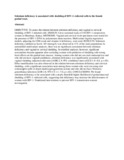Selenium deficiency is associated with shedding of HIV-1--infected cells in the female genital tract.

View/
Date
2001Author
Baeten, JM
Mostad, SB
Hughes, MP
Overbaugh, J
Bankson, DD
Ndinya-Achola Jeckoniah O.
Bwayo, JJ
Kreiss, JK
Mandaliya, K
Type
ArticleLanguage
enMetadata
Show full item recordAbstract
Objective: To assess the relation between selenium deficiency and vaginal or cervical shedding of HIV-1-infected cells.
Design: Cross-sectional study of 318 HIV-1 seropositive women in Mombasa, Kenya.
Methods: Vaginal and cervical swab specimens were tested for the presence of HIV-1 DNA by polymerase chain reaction. Multivariate logistic regression models, adjusting for CD4 count and vitamin A deficiency, were used.
Results: Selenium deficiency (defined as levels <85 microg/L) was observed in 11% of the study population. In unstratified multivariate analyses, there was no significant association between selenium deficiency and vaginal or cervical shedding. In stratified analyses, however, significant associations became apparent after excluding women with predictors of shedding with strong local effects on the genital tract mucosa. Among women who did not use oral contraceptives and who did not have vaginal candidiasis, selenium deficiency was significantly associated with vaginal shedding (adjusted odds ratio [AOR] 2.9, 95% confidence interval [CI] 1.0--8.8, p =.05). Effect modification was also observed in the relation between selenium deficiency and cervical shedding, with a significant association seen among those women who were not using oral contraceptive pills or depot medroxyprogesterone acetate and who did not have Neisseria gonorrhoeae infection (AOR 2.8, 95% CI 1.1--7.0, p =.02).
Conclusions: We found selenium deficiency to be associated with a nearly threefold higher likelihood of genital mucosal shedding of HIV-1--infected cells, suggesting that deficiency may increase the infectiousness of women with HIV-1. Nutritional interventions to prevent HIV-1 transmission warrant investigation
URI
http://www.ncbi.nlm.nih.gov/pubmed/11317079.http://erepository.uonbi.ac.ke:8080/xmlui/handle/123456789/16765
Citation
J Acquir Immune Defic Syndr. 2001 Apr 1;26(4):360-4Publisher
Department of Epidemiology, University of Washington, Seattle, Department of Medical Microbiology, University of Nairobi
Collections
- Faculty of Health Sciences (FHS) [10378]
